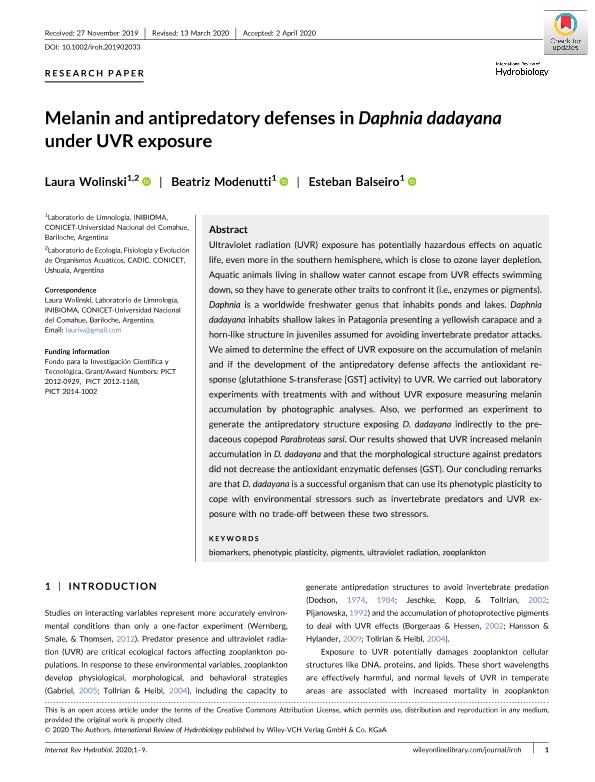Mostrar el registro sencillo del ítem
dc.contributor.author
Wolinski, Laura Isabel

dc.contributor.author
Modenutti, Beatriz Estela

dc.contributor.author
Balseiro, Esteban Gabriel

dc.date.available
2020-07-20T16:08:34Z
dc.date.issued
2020-04
dc.identifier.citation
Wolinski, Laura Isabel; Modenutti, Beatriz Estela; Balseiro, Esteban Gabriel; Melanin and antipredatory defenses in Daphnia dadayana under UVR exposure; Wiley VCH Verlag; International Review of Hydrobiology; 105; 4; 4-2020; 106-114
dc.identifier.issn
1434-2944
dc.identifier.uri
http://hdl.handle.net/11336/109664
dc.description.abstract
Ultraviolet radiation (UVR) exposure has potentially hazardous effects on aquatic life, even more in the southern hemisphere, which is close to ozone layer depletion. Aquatic animals living in shallow water cannot escape from UVR effects swimming down, so they have to generate other traits to confront it (i.e., enzymes or pigments). Daphnia is a worldwide freshwater genus that inhabits ponds and lakes. Daphnia dadayana inhabits shallow lakes in Patagonia presenting a yellowish carapace and a horn‐like structure in juveniles assumed for avoiding invertebrate predator attacks. We aimed to determine the effect of UVR exposure on the accumulation of melanin and if the development of the antipredatory defense affects the antioxidant response (glutathione S‐transferase [GST] activity) to UVR. We carried out laboratory experiments with treatments with and without UVR exposure measuring melanin accumulation by photographic analyses. Also, we performed an experiment to generate the antipredatory structure exposing D. dadayana indirectly to the predaceous copepod Parabroteas sarsi. Our results showed that UVR increased melanin accumulation in D. dadayana and that the morphological structure against predators did not decrease the antioxidant enzymatic defenses (GST). Our concluding remarks are that D. dadayana is a successful organism that can use its phenotypic plasticity to cope with environmental stressors such as invertebrate predators and UVR exposure with no trade‐off between these two stressors.
dc.format
application/pdf
dc.language.iso
eng
dc.publisher
Wiley VCH Verlag

dc.rights
info:eu-repo/semantics/openAccess
dc.rights.uri
https://creativecommons.org/licenses/by/2.5/ar/
dc.subject
BIOMARKERS
dc.subject
PHENOTYPIC
dc.subject
PLASTICITY
dc.subject
PIGMENTS
dc.subject
ULTRAVIOLET RADIATION
dc.subject
ZOOPLANKTON
dc.subject.classification
Ecología

dc.subject.classification
Ciencias Biológicas

dc.subject.classification
CIENCIAS NATURALES Y EXACTAS

dc.title
Melanin and antipredatory defenses in Daphnia dadayana under UVR exposure
dc.type
info:eu-repo/semantics/article
dc.type
info:ar-repo/semantics/artículo
dc.type
info:eu-repo/semantics/publishedVersion
dc.date.updated
2020-06-08T15:10:30Z
dc.identifier.eissn
1522-2632
dc.journal.volume
105
dc.journal.number
4
dc.journal.pagination
106-114
dc.journal.pais
Alemania

dc.journal.ciudad
Weinheim
dc.description.fil
Fil: Wolinski, Laura Isabel. Consejo Nacional de Investigaciones Científicas y Técnicas. Centro Científico Tecnológico Conicet - Patagonia Norte. Instituto de Investigaciones en Biodiversidad y Medioambiente. Universidad Nacional del Comahue. Centro Regional Universidad Bariloche. Instituto de Investigaciones en Biodiversidad y Medioambiente; Argentina
dc.description.fil
Fil: Modenutti, Beatriz Estela. Consejo Nacional de Investigaciones Científicas y Técnicas. Centro Científico Tecnológico Conicet - Patagonia Norte. Instituto de Investigaciones en Biodiversidad y Medioambiente. Universidad Nacional del Comahue. Centro Regional Universidad Bariloche. Instituto de Investigaciones en Biodiversidad y Medioambiente; Argentina
dc.description.fil
Fil: Balseiro, Esteban Gabriel. Consejo Nacional de Investigaciones Científicas y Técnicas. Centro Científico Tecnológico Conicet - Patagonia Norte. Instituto de Investigaciones en Biodiversidad y Medioambiente. Universidad Nacional del Comahue. Centro Regional Universidad Bariloche. Instituto de Investigaciones en Biodiversidad y Medioambiente; Argentina
dc.journal.title
International Review of Hydrobiology

dc.relation.alternativeid
info:eu-repo/semantics/altIdentifier/doi/http://dx.doi.org/10.1002/iroh.201902033
dc.relation.alternativeid
info:eu-repo/semantics/altIdentifier/url/https://onlinelibrary.wiley.com/doi/full/10.1002/iroh.201902033
Archivos asociados
